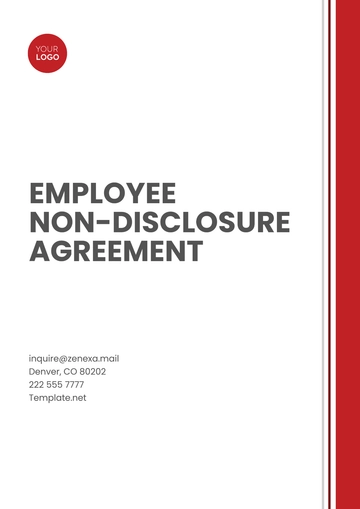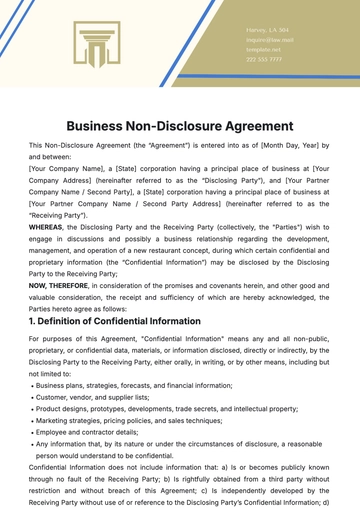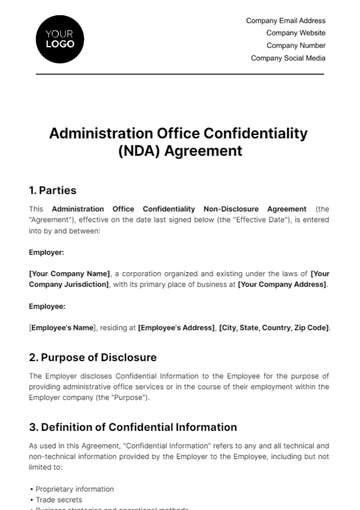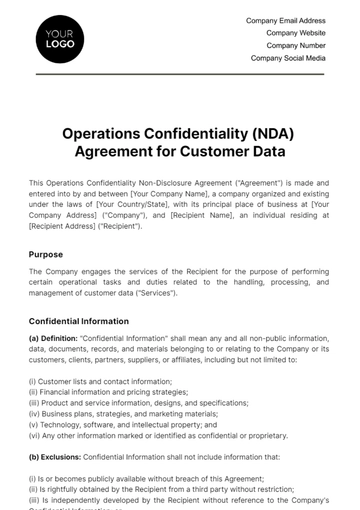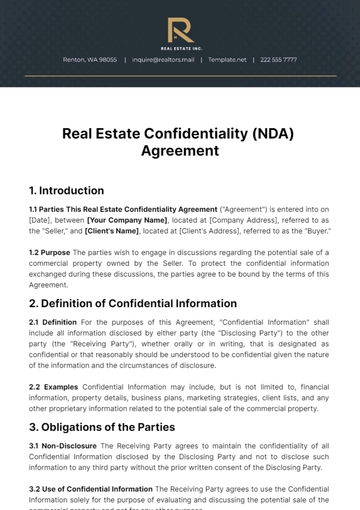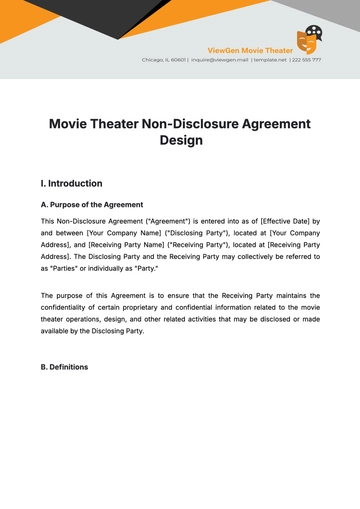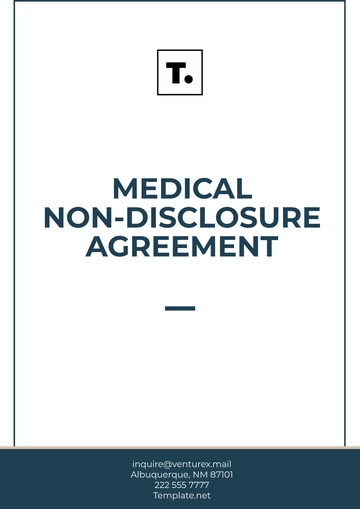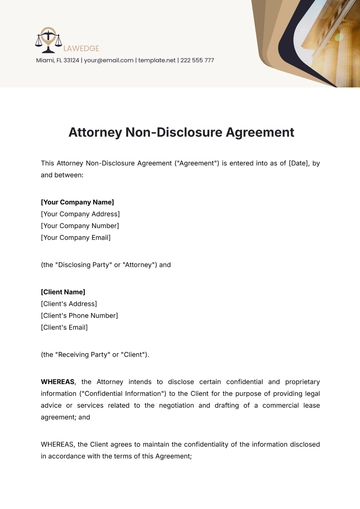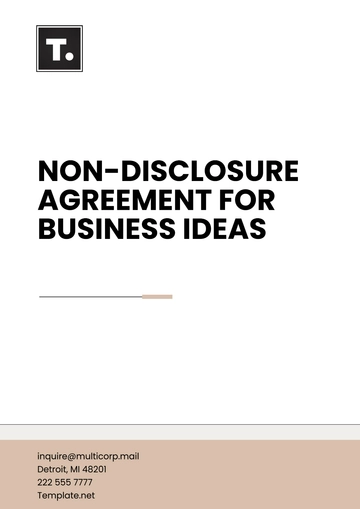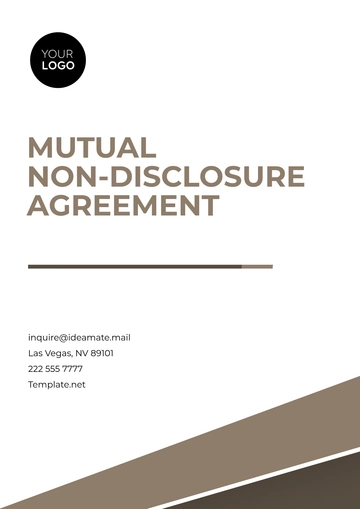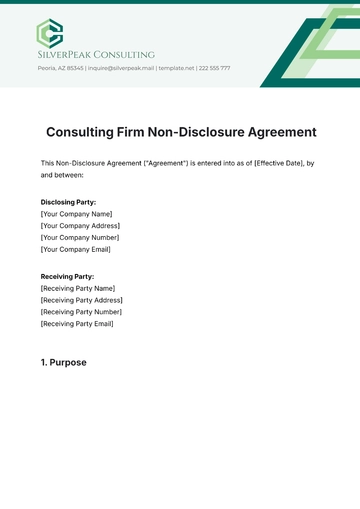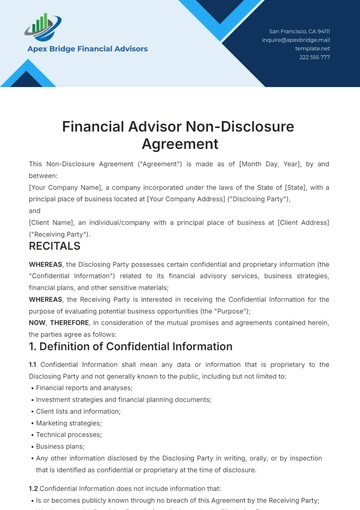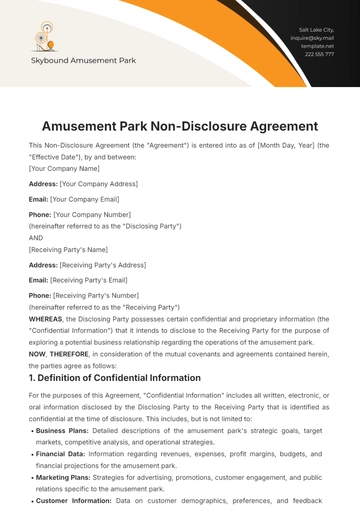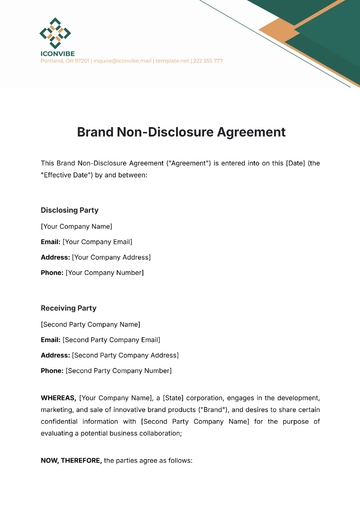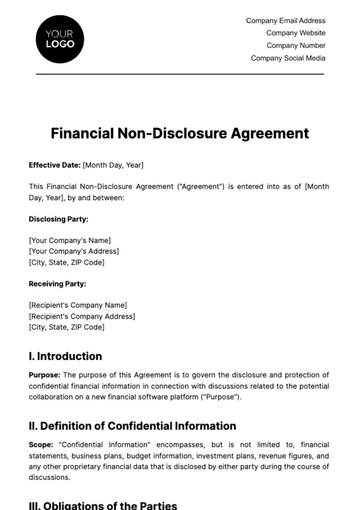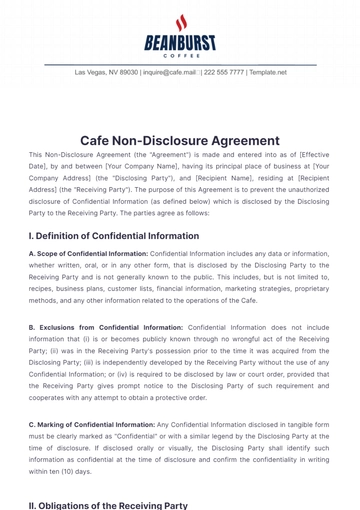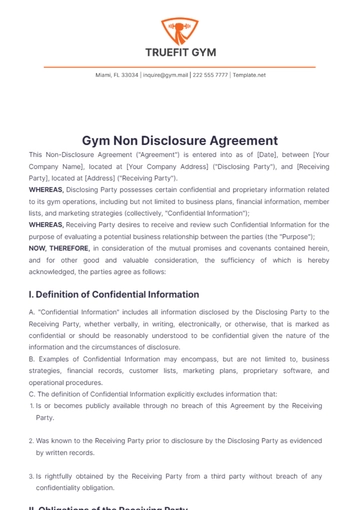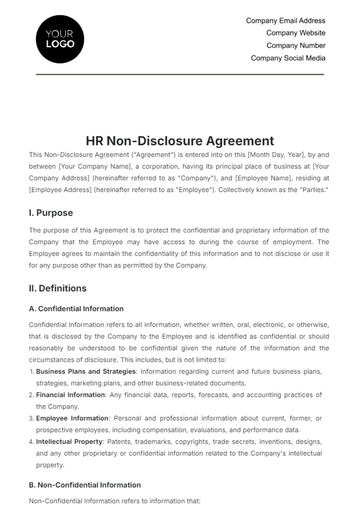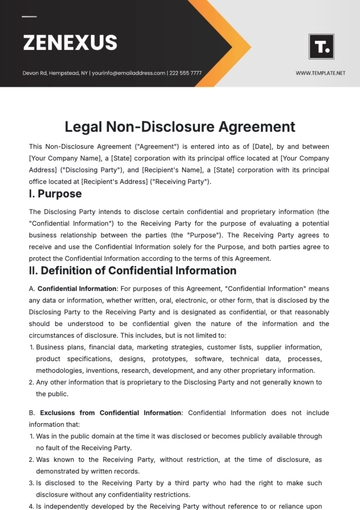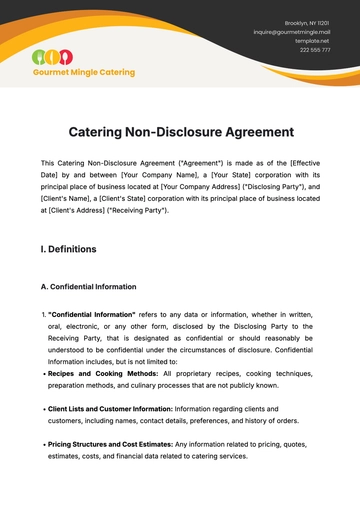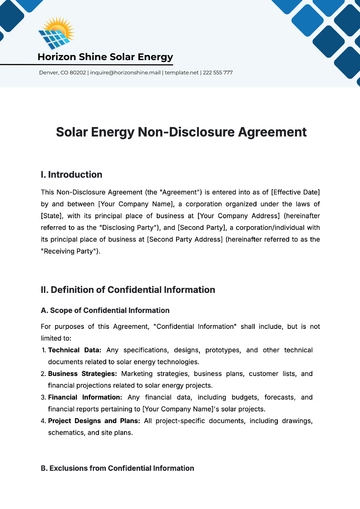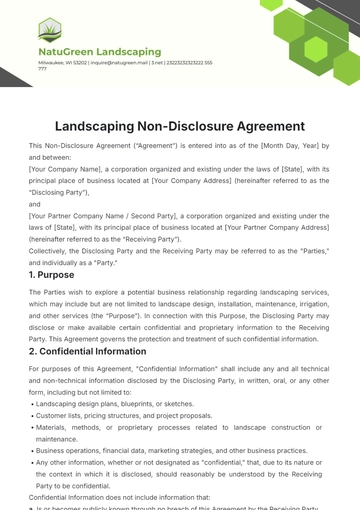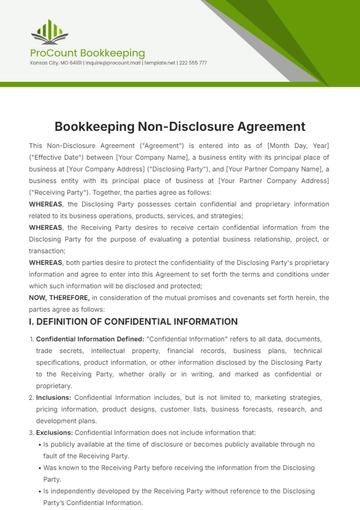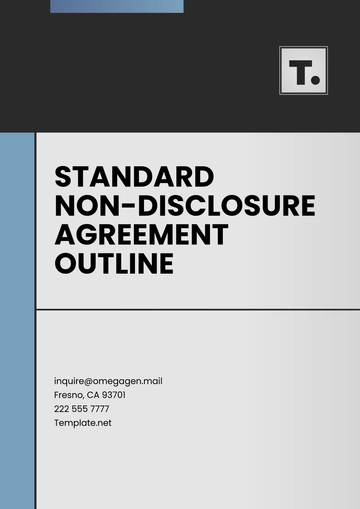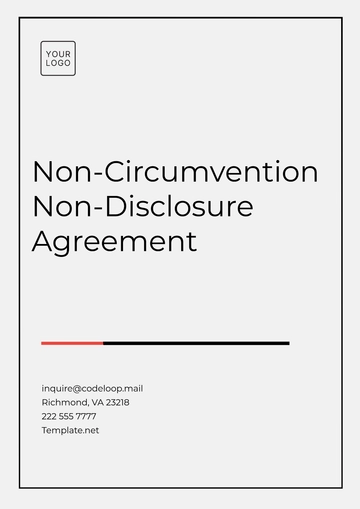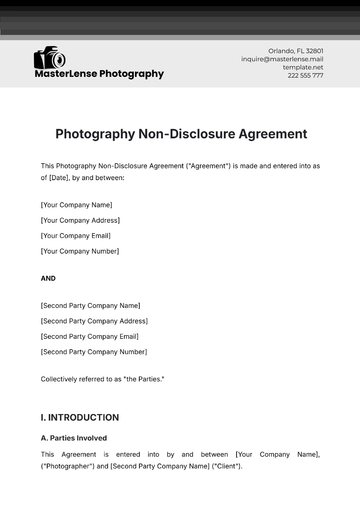Free Affiliate Marketing Non-Disclosure Agreement
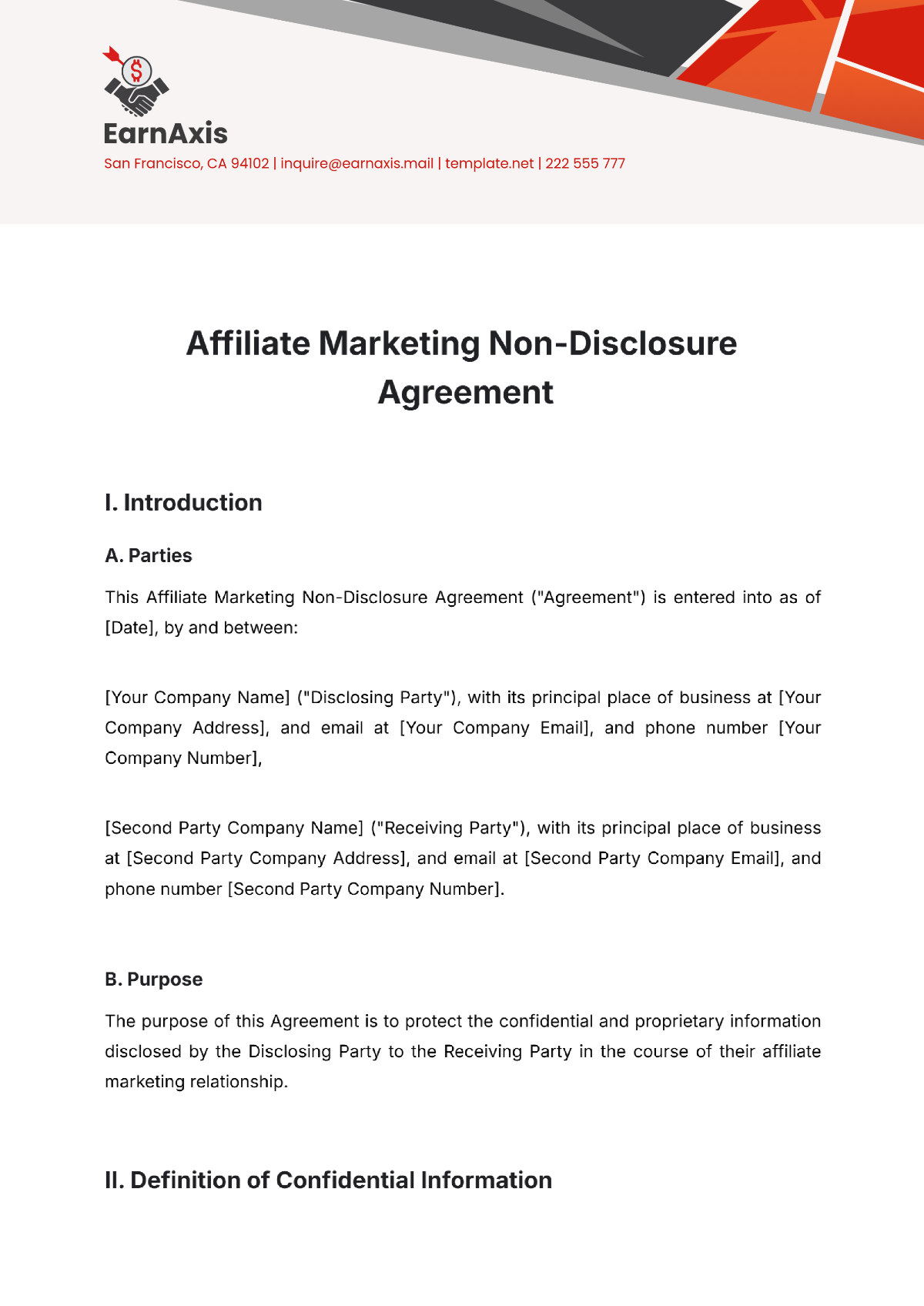
I. Introduction
A. Parties
This Affiliate Marketing Non-Disclosure Agreement ("Agreement") is entered into as of [Date], by and between:
[Your Company Name] ("Disclosing Party"), with its principal place of business at [Your Company Address], and email at [Your Company Email], and phone number [Your Company Number],
[Second Party Company Name] ("Receiving Party"), with its principal place of business at [Second Party Company Address], and email at [Second Party Company Email], and phone number [Second Party Company Number].
B. Purpose
The purpose of this Agreement is to protect the confidential and proprietary information disclosed by the Disclosing Party to the Receiving Party in the course of their affiliate marketing relationship.
II. Definition of Confidential Information
A. Scope of Confidential Information
Confidential Information includes, but is not limited to, the following types of information disclosed by the Disclosing Party to the Receiving Party:
Business plans, marketing strategies, and promotional materials.
Product details, specifications, pricing, and sales strategies.
Customer lists, transaction data, and other customer-related information.
Intellectual property, including trademarks, copyrights, patents, and proprietary content.
Any other information deemed confidential by the Disclosing Party.
III. Obligations of the Receiving Party
A. Non-Disclosure
The Receiving Party agrees not to disclose any Confidential Information to any third party without the prior written consent of the Disclosing Party.
B. Non-Use
The Receiving Party agrees that the Confidential Information will be used solely for the purpose of performing affiliate marketing services for the Disclosing Party and will not be used for any personal or business purposes outside the scope of this Agreement.
C. Care and Protection
The Receiving Party agrees to take all reasonable steps to protect the Confidential Information and to use the same level of care in safeguarding it as the Receiving Party uses to protect its own confidential information.
IV. Exceptions to Confidentiality
A. Information Not Covered
Confidential Information does not include any information that:
Was already in the public domain at the time of disclosure or becomes publicly available through no fault of the Receiving Party.
Was known to the Receiving Party prior to disclosure by the Disclosing Party, as evidenced by written records.
Is disclosed with the written consent of the Disclosing Party.
Is required to be disclosed by law, regulation, or legal process (provided that the Receiving Party promptly notifies the Disclosing Party).
V. Duration of the Agreement
A. Term of NDA
This Agreement shall remain in effect for a period of [00] years from the date of execution unless terminated earlier in accordance with this Agreement.
B. Termination of Confidentiality
The confidentiality obligations described herein shall remain in effect for a period of [00] years following the termination of the affiliate marketing relationship between the parties.
VI. Consequences of Breach
A. Remedies for Breach
If the Receiving Party breaches any provision of this Agreement, the Disclosing Party may pursue any and all legal remedies, including but not limited to:
Seeking injunctive relief to prevent further disclosures.
Terminating the affiliate marketing relationship.
Seeking damages for any harm caused by the breach.
VII. Return or Destruction of Confidential Information
A. Obligation to Return or Destroy
Upon termination of the affiliate marketing relationship or upon request by the Disclosing Party, the Receiving Party agrees to promptly return or destroy all Confidential Information provided by the Disclosing Party, including any copies, summaries, or other forms of the Confidential Information.
VIII. No License or Rights Granted
A. Ownership
Nothing in this Agreement grants the Receiving Party any rights, titles, or licenses to the Confidential Information or any intellectual property of the Disclosing Party. All rights to the Confidential Information remain the sole property of the Disclosing Party.
IX. Miscellaneous Provisions
A. Governing Law
This provision specifies the jurisdiction whose laws will apply to interpret and enforce the agreement. For example, if the agreement is governed by the laws of California, any disputes will be resolved according to California's legal framework. Choosing a governing law ensures clarity and consistency, especially if the parties are in different regions or countries.
B. Dispute Resolution
This section outlines how disputes related to the agreement will be handled, such as through mediation, arbitration, or court litigation. Mediation and arbitration are often preferred for their efficiency, confidentiality, and lower costs compared to court proceedings. Specifying a location for dispute resolution ensures convenience for both parties and avoids confusion during legal processes.
C. Severability
This clause ensures that if any part of the agreement is found to be invalid or unenforceable by a court, the remaining provisions will still be effective. For instance, if one clause violates local law, it can be removed without voiding the entire agreement. This protects the integrity and enforceability of the rest of the contract.
D. Entire Agreement
This clause confirms that the document represents the full understanding between the parties regarding confidentiality and supersedes all prior discussions or agreements, whether oral or written. It prevents misunderstandings by ensuring that only the terms in the current agreement are enforceable. Any changes or additions must be made in writing and signed by both parties.
X. Execution
By signing below, both parties agree to the terms and conditions outlined in this Agreement.
 [Your Name]
[Your Name]
[Your Company Name]
[Date]
 [Representative's Name]
[Representative's Name]
[Second Party Company Name]
[Date]
- 100% Customizable, free editor
- Access 1 Million+ Templates, photo’s & graphics
- Download or share as a template
- Click and replace photos, graphics, text, backgrounds
- Resize, crop, AI write & more
- Access advanced editor
Enhance your affiliate marketing partnerships with the Affiliate Marketing Non-Disclosure Agreement Template from Template.net. This editable and customizable template allows you to easily tailor the NDA to your specific needs. With the AI Editor Tool, you can quickly adjust the document, ensuring seamless and professional agreements that protect your sensitive business information.
You may also like
- Lease Agreement
- Non Compete Agreement
- Rental Agreement
- Prenuptial Agreement
- Non Disclosure Agreement
- Operating Agreement
- Hold Harmless Agreement
- LLC Operating Agreement
- Arbitration Agreement
- Purchase Agreement
- Residential Lease Agreement
- Executive Agreement
- Confidentiality Agreement
- Contractor Agreement
- Partnership Agreement
- Postnuptial Agreement
- Collective Bargaining Agreement
- Loan Agreement
- Roommate Agreement
- Commercial Lease Agreement
- Separation Agreement
- Cohabitation Agreement
- Room Rental Agreement
- Child Custody Agreement
- Employee Agreement
- License Agreements
- Settlement Agreement
- Joint Venture Agreement
- Indemnity Agreement
- Subordination Agreement
- Sales Agreement
- Agreements Between Two Parties
- Business Agreement
- Real Estate Agreement
- HR Agreement
- Service Agreement
- Property Agreement
- Agreement Letter
- Restaurant Agreement
- Construction Agreement
- Finance Agreement
- Marketing Agreement
- Payment Agreement
- Investment Agreement
- Management Agreement
- Nonprofit Agreement
- Software Agreement
- Startup Agreement
- Agency Agreement
- Copyright Agreement
- Collaboration Agreement
- Reseller Agreement
- Car Rental Agreement
- Cleaning Services Agreement
- Consultant Agreement
- Deed Agreement
- Car Agreement
- Equipment Agreement
- Shares Agreement
- Data Sharing Agreement
- Advertising Agreement
- School Agreement
- Franchise Agreement
- Event Agreement
- Travel Agency Agreement
- Vehicle Agreement
- Board Resolution Agreement
- Land Agreement
- Binding Agreement
- Tenancy Agreement
- Exclusive Agreement
- Development Agreement
- Assignment Agreement
- Design Agreement
- Equity Agreement
- Mortgage Agreement
- Purchase and Sale Agreement
- Shareholder Agreement
- Vendor Agreement
- Royalty Agreement
- Vehicle Lease Agreement
- Hotel Agreement
- Tenant Agreement
- Artist Agreement
- Commission Agreement
- Consignment Agreement
- Debt Agreement
- Recruitment Agreement
- Training Agreement
- Transfer Agreement
- Apprenticeship Agreement
- IT and Software Agreement
- Referral Agreement
- Resolution Agreement
- Waiver Agreement
- Consent Agreement
- Partner Agreement
- Social Media Agreement
- Customer Agreement
- Credit Agreement
- Supply Agreement
- Agent Agreement
- Brand Agreement
- Law Firm Agreement
- Maintenance Agreement
- Mutual Agreement
- Retail Agreement
- Deposit Agreement
- Land Purchase Agreement
- Nursing Home Agreement
- Supplier Agreement
- Buy Sell Agreement
- Child Support Agreement
- Landlord Agreement
- Payment Plan Agreement
- Release Agreement
- Research Agreement
- Sponsorship Agreement
- Buyout Agreement
- Equipment Rental Agreement
- Farm Agreement
- Manufacturing Agreement
- Strategic Agreement
- Termination of Lease Agreement
- Compliance Agreement
- Family Agreement
- Interior Design Agreement
- Ownership Agreement
- Residential Lease Agreement
- Retainer Agreement
- Trade Agreement
- University Agreement
- Broker Agreement
- Dissolution Agreement
- Funding Agreement
- Hosting Agreement
- Investor Agreement
- Memorandum of Agreement
- Advisory Agreement
- Affiliate Agreement
- Freelancer Agreement
- Grant Agreement
- Master Service Agreement
- Parking Agreement
- Subscription Agreement
- Trust Agreement
- Cancellation Agreement
- Horse Agreement
- Influencer Agreement
- Membership Agreement
- Vacation Rental Agreement
- Wholesale Agreement
- Author Agreement
- Distributor Agreement
- Exchange Agreement
- Food Agreement
- Guarantee Agreement
- Installment Agreement
- Internship Agreement
- Music Agreement
- Severance Agreement
- Software Development Agreement
- Storage Agreement
- Facility Agreement
- Intercompany Agreement
- Lending Agreement
- Lodger Agreement
- Outsourcing Services Agreement
- Usage Agreement
- Assurance Agreement
- Photography Agreement
- Profit Sharing Agreement
- Relationship Agreement
- Rent To Own Agreement
- Repayment Agreement
- Volunteer Agreement
- Co Parenting Agreement
- HVAC Agreement
- Lawn Care Agreement
- SAAS Agreement
- Work from Home Agreement
- Coaching Agreement
- Protection Agreement
- Security Agreement
- Repair Agreement
- Agreements License

